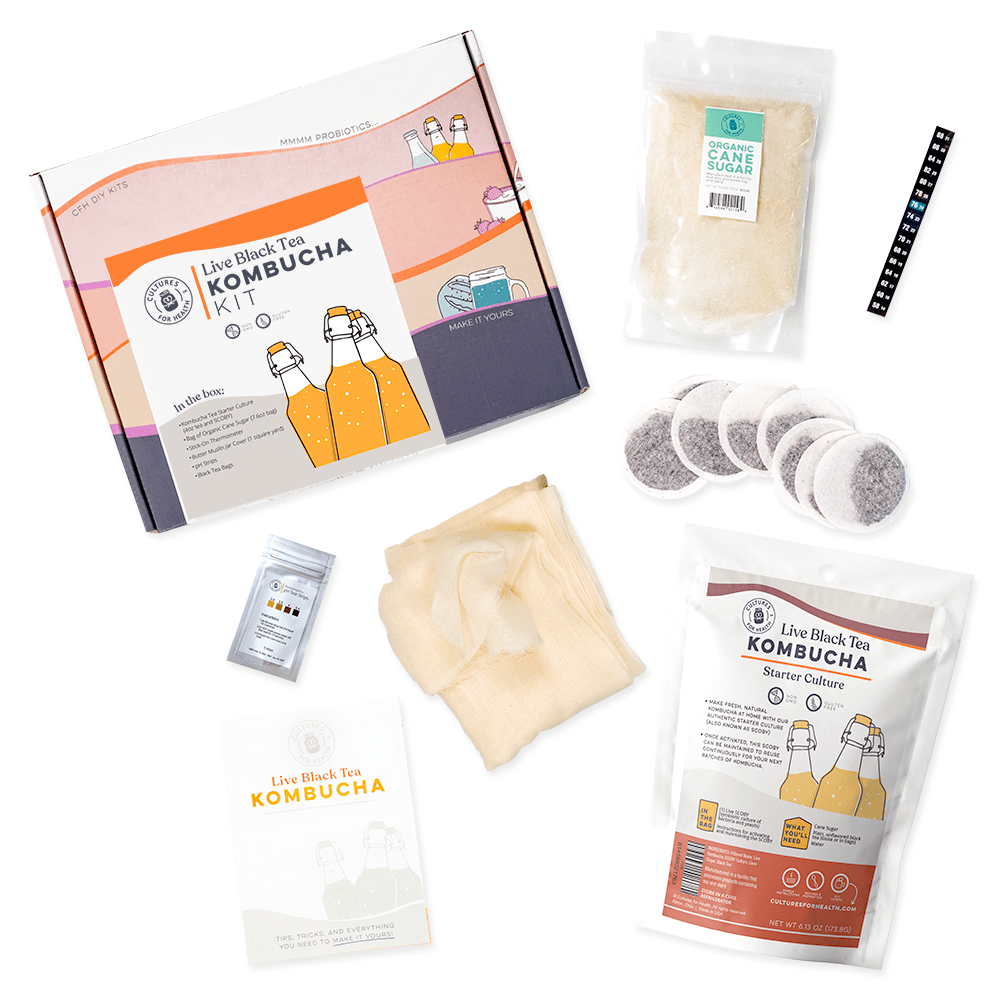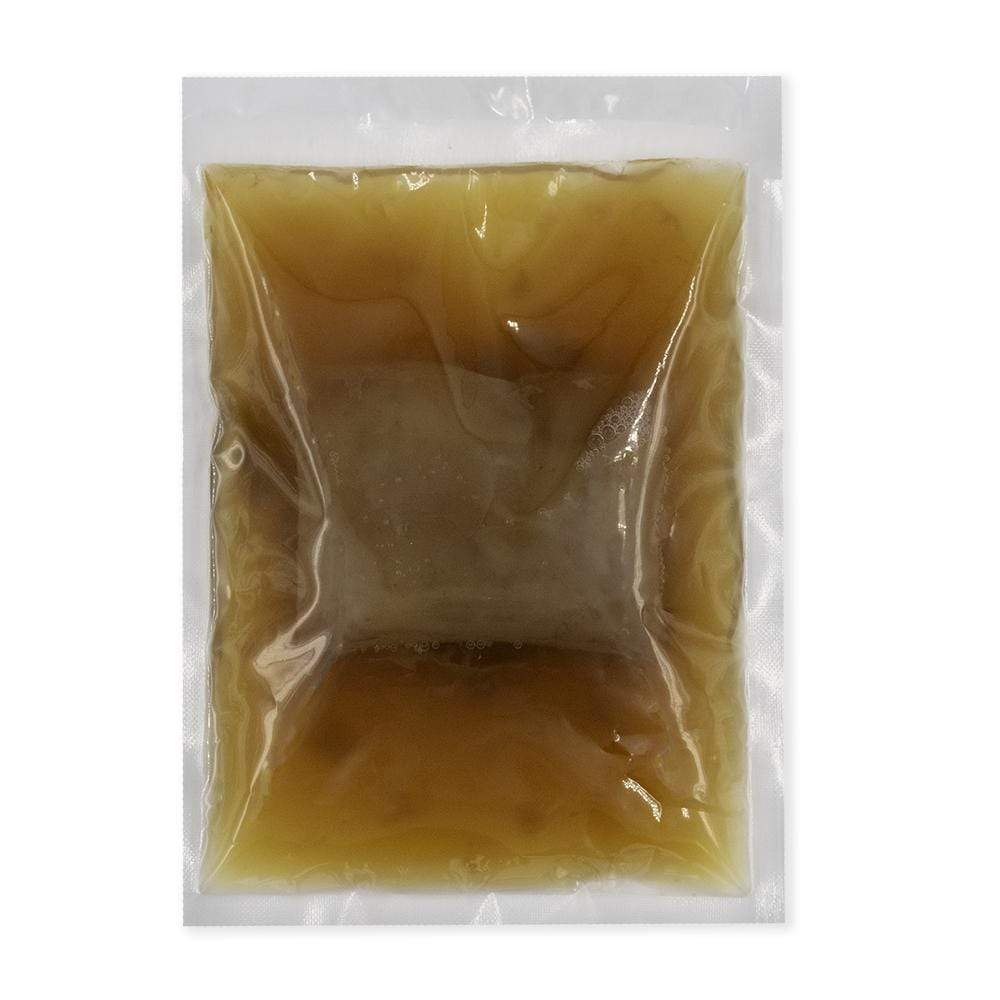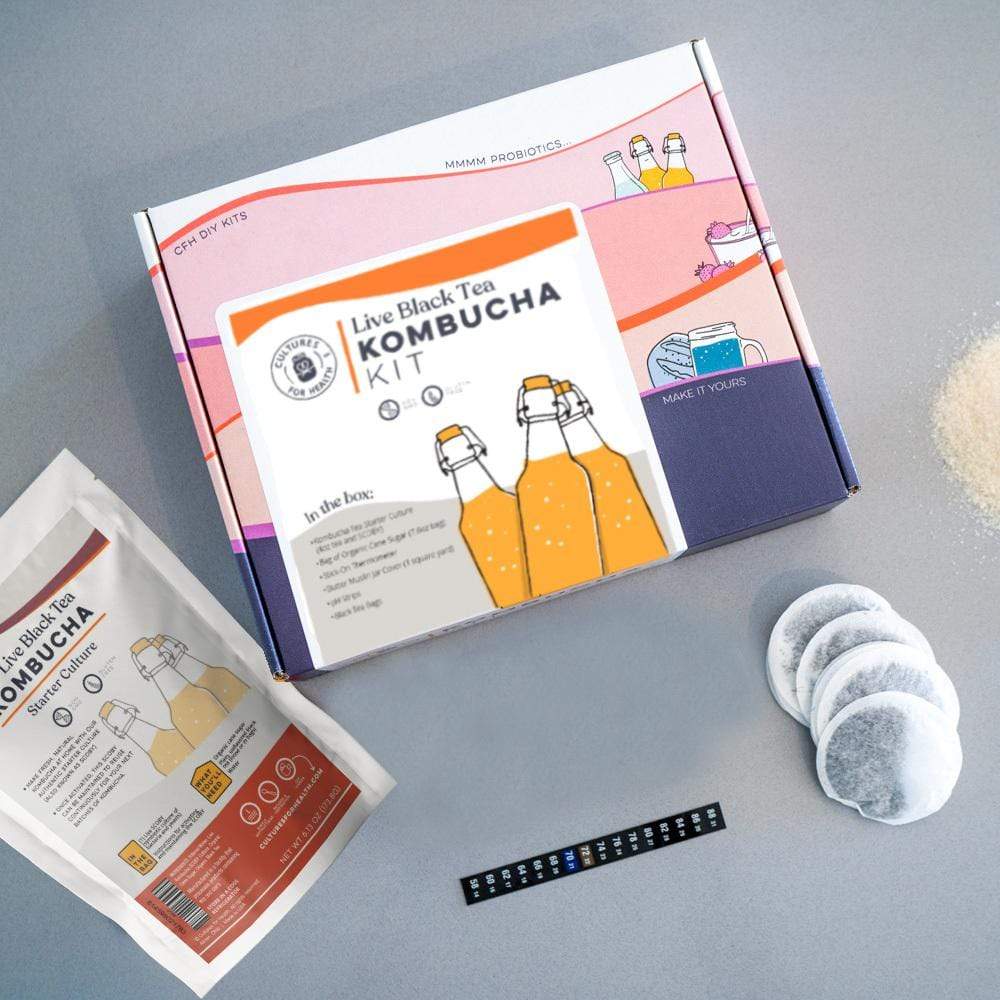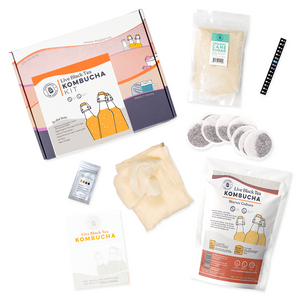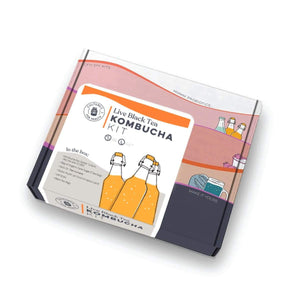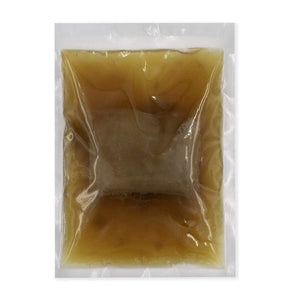
Kombucha is one of the top selling fermented drinks in the United States. It's delicious, easy to make, and can be used in many different ways. But is kombucha good for you? Does it really deserve all the hype it gets? Let's take a look at kombucha benefits, its nutritional facts, and how you can incorporate kombucha into your diet.
What is Kombucha and Why is it Good For You?

Kombucha is a fizzy sweet-and-sour fermented tea that has been used for hundreds of years. It’s also sometimes referred to as “mushroom tea” because the kombucha SCOBYs look like mushroom caps. Although the origin of kombucha is still unknown, many believe it originated in China, and then came to Japan and Russia.
Kombucha is made by fermenting sweetened black or green tea with a kombucha starter. The fermentation process creates a probiotic drink that's full of organic acids, enzymes, vitamins, proteins, polyphenols, and minerals. These include B vitamins, Vitamin C, amino acids, and antioxidants. All of these components work together to give you the health benefits that this divine drink is so famous for.
Live Black Tea Kombucha Starter Kit
Chemical Composition of Kombucha:
|
Organic Acids |
Amino Acids |
Vitamins |
Minerals |
Other Elements |
|
Acetic Acid, Butyric Acid, Citric Acid, Gluconic Acid, Glucuronic Acid, Lactic Acid, Malic Acid, Oxalic Acid, Pyruvic Acid, Succinic Acid, Tartaric Acid |
Alanine, Arginine, Aspartic Acid, Cysteine, Glutamic Acid, Glycine, Histidine, Leucine, Lysine, Isoleucine, Methionine, Phenylalanine, Threonine, Valine, Tryptophan, Proline, Tyrosine, Serine |
B1 (Thiamine), B2 (Riboflavin), B6 (Pyridoxine), B9 (Folic Acid), B12 (Cobalamin), Vitamin C |
Manganese, Iron, Phosphate, Copper, Zinc, Nitrate, Nickel, Sulfate, Fluoride, Chloride, Iodide, Bromide, Cobalt |
Catechins, Caffeine, Theaflavin, Peptides, Biogenic Amines, Thearubigins, Gallotannins, Alcohol |
See Related: Does Kombucha Have Alcohol?
The Health Benefits of Kombucha
There are plenty of kombucha benefits. For instance, it has been touted as a powerhouse of antioxidants and probiotics. Kombucha is also famed for improving gut health, boosting the immune system, reducing inflammation in the body, regulating blood sugar levels, and even boosting cardiovascular health. Below we briefly discuss some of the potential health benefits of kombucha that are backed by scientific research:
Kombucha Can Boost Gut Health and Immune System
Drinking kombucha is a great way to boost your gut health and immune system! Kombucha has also been reported to have antimicrobial effects against many pathogenic organisms; for example, E. coli, H. pylori, M. luteus, L. monocytogenes, P. aeruginosa, B. cereus, Candida species, and many more.
Kombucha targets these pathogens by disrupting their cell membranes and inhibiting their metabolic actions. Gluconic and acetic acids are also present in kombucha and contribute to its anti-infection properties by changing the pH of the pathogenic cells. Benzonitrile, benzoic acid, and itaconic acid also play a role in boosting your immune system and keeping you healthy.
Kombucha Can Improve Digestion
Kombucha is an ancient folk remedy that has been used for hundreds of years to help the digestive system. Today it's also been proven effective by modern science.
This fermented tea is packed with probiotics that can help soothe digestive issues like bloating, gas, diarrhea, constipation, and even acid reflux.
Acid reflux affects 20% of Americans at some point in their lives. Kombucha has been shown to reduce the symptoms of acid reflux. This is because kombucha kills H. pylori, the bacteria that cause ulcers and acid reflux, on contact.
Studies have shown that kombucha can be as effective as omeprazole (the generic form of Prilosec) at treating ulceration and reducing acid reflux. Researchers also point out that black tea kombucha seems to be more effective than others at reducing acid reflux symptoms.
Furthermore, if you're suffering from irritable bowel syndrome or malabsorption of food, kombucha is a great option for alleviating some of the symptoms.
Kombucha Can Assist in Weight Loss

If you're trying to lose weight, kombucha may help you achieve your goals by working to reduce cravings and improve digestion.
In one study, rats who consumed kombucha had lower levels of fat than rats who didn't consume it. In another study, diabetic rats were given green tea kombucha and were found to have lower body weights than those not consuming it.
Additionally, kombucha helps your body detoxify, because it contains enzymes and acids that help cleanse your body of toxins.
Kombucha Reduces Joint Pain
Kombucha is not just a delicious drink that can help you slim down. It's also a great beverage to add to your diet if you're looking to improve joint health.
One of the main active compounds in kombucha is glucuronic acid. The human body can convert this acid into several essential acidic mucopolysaccharides, such as hyaluronic acid, chondroitin sulfate, and glucosamine. All these compounds play an important role in building and maintaining healthy joints and preventing arthritis pain.
Kombucha Has Antioxidants That May Help Prevent Cancer
A handful of studies have shown that kombucha tea has higher levels of antioxidants than regular tea. Antioxidants are great for your health and may help to prevent cancer, because they keep free radicals in balance.
The cancer-killing properties of kombucha have been known for quite some time now. A study found that black tea kombucha was more effective at destroying Caco-2 colorectal cancer cells than normal cells.
The exact mechanisms by which kombucha destroys cancer cells are not yet completely understood. However, researchers suggest that tea leaves, which provide many active components, and the metabolites released from SCOBY activity are responsible for kombucha's anticancer ability.
Kombucha May Improve Liver Health
In animal studies, researchers have found that kombucha can help reduce the effects of liver damage.
In one study, the researchers tested the effects of different doses of kombucha tea on laboratory mice. They found that it reduced oxidative stress and inflammation, while also preventing fat accumulation in the liver. Another study found that black tea kombucha may help promote intestinal microbes, which could reduce nonalcoholic fatty liver disease.
Kombucha May Help Manage Type II Diabetes
According to numerous studies, kombucha contains many positive effects for people with Type II diabetes. The researchers found that kombucha helps reduce blood sugar levels and increase insulin sensitivity, which can be helpful in managing the disease.
Researchers at the University of Sfax also tested the effects of kombucha on diabetic rats in 2012. They found that rats who drank kombucha had lower levels of blood glucose compared to the control group.
Kombucha May Boost Heart Health
In animal studies, researchers have found that kombucha may be good for heart health. Many studies have linked kombucha use to improvements in cholesterol levels and reduced arteriosclerosis risk.
A 2011 study found that total cholesterol levels decreased by as much as 52% in rats who were fed kombucha. The bad cholesterol (LDL) dropped by as much as 91%, and the good cholesterol (HDL) increased by as much as 27%.
Another 2012 study found that rats who consumed kombucha had lower levels of cholesterol and greater weight reduction than their peers who drank unfermented black tea.
Kombucha May Help Relieve Asthma Symptoms
Kombucha has also been shown to help those who have asthma.
A handful of studies have shown that kombucha brewed with black tea can increase theophylline levels. Theophylline is used for asthma treatment, and the amount found in kombucha is considered a therapeutic dose for those using it as a treatment for asthma.
Plus, kombucha also contains caffeine and heparin, which have been linked to the relief of asthma symptoms.
See Related: Does Kombucha Have Caffeine?
How To Incorporate Kombucha into Your Diet:
Now that you know the various health benefits of kombucha, you might be wondering how to incorporate it into your diet. Here are a few ways to get started:
-
Make kombucha a part of your morning routine. Start off your day with a glass of kombucha. The probiotic content and antioxidants in kombucha will get your digestive tract moving and give you energy. Drink it straight up or with ice instead of coffee or tea. This is the most common way people drink kombucha.
-
Try different flavors. If you're new to kombucha and have trouble acquiring a taste for plain kombucha, try different flavors. Hundreds of options are available in stores and online, so try a few new ones each time you buy some!
-
Consume it as a snack. If you're getting hungry between meals, grab a bottle of kombucha to tide yourself over until mealtime rolls around again. This way, when hunger pangs hit, they won't trigger overeating or binging on junk food (which is what most people do).
-
Kombucha can also be used as an ingredient in smoothies, salad dressings, and more. You can also make delicious kombucha sauce. You can also try adding it to cocktails or using it as a marinade for meat! The possibilities are endless when incorporating kombucha into recipes—just remember that if you cook with kombucha, you’ll get the great flavors, but it will kill the probiotics.
-
Consider making your own kombucha at home, rather than buying it from the store. This will save money, while also allowing you to control what goes into your drink.
Note: If you want to know what is a scoby or you're interested in making kombucha yourself and want to buy a kit that includes everything you need (including a SCOBY), check out our kombucha kits!
See Related: Homemade Kombucha Recipe
The Takeaway For Kombucha Benefits
Kombucha is a naturally fermented drink that contains organic acids, amino acids, enzymes, probiotics, and polyphenols. Research into kombucha benefits is ongoing—but there’s already a significant amount of evidence supporting its potential as a detoxifying agent, immune system booster, anti-inflammatory agent, and cancer fighter. So start making kombucha a part of your life, and experience its benefits for yourself!













